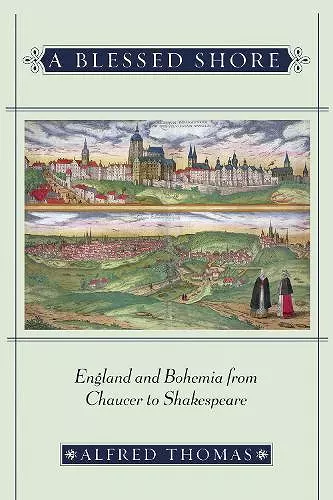A Blessed Shore
England and Bohemia from Chaucer to Shakespeare
Format:Hardback
Publisher:Cornell University Press
Published:15th Aug '07
Currently unavailable, and unfortunately no date known when it will be back

In The Winter's Tale, Antigonus announces that his ship has washed up on the shores of Bohemia. How and why landlocked Bohemia? Did Shakespeare not know his geography, or is something else at work here? Alfred Thomas answers these questions by exploring cross-cultural interactions between England and Bohemia from the fourteenth to the early seventeenth century. He is interested less in the diplomacy and politics of this history than in the images—the shifting blends of fact and fiction—that each of the two cultures nourished about the other.
Although Thomas gives original readings of famous English texts by Chaucer and Shakespeare, this is also a book about Czech writers and travelers; one Czech expatriate, Anne of Bohemia, became Queen of England. For both countries these were decades of religious and dynastic turbulence, and Thomas's analyses of the relations between Wyclif and Hus, Lollards and Hussites, help us to understand why Bohemia was viewed as an almost utopian land of refuge ("a blessed shore" on which a ship might wash up) for persecuted English men and women. Of particular interest is his analysis of the ways in which English court culture emulated that of Prague, which was an imperial seat at a time when England was still a peripheral place with little influence on the heart of Europe. Thomas shows that the relationship between the two cultures was never a straightforward one, but a mirror-like formation in which each saw the other "through the distorted and subjective effect of its own reflection."
"Thomas's examination of late medieval and early modern England and Bohemia sheds light not only on the countries' cultural and political ties, but also on the modern conception of "Bohemian," which today exists wholly independently of geographic boundaries and temporal constraints. . . . It is an authoritative and thorough history of England and Bohemia in the Middle Ages. Combining historical, literary, and social analysis, Thomas has produced a work that will be of interest and use to a diverse audience."—Eric Christensen, Slavic and East European Journal
"A remarkable historical conjuncture brought together England and Bohemia in the late Middle Ages. King Richard II's wife was an imperial-royal princess who brought with her the court culture of central Europe. Then, en revanche, the fiercely antiestablishment John Wyclif inspired Bohemia's Hussites, Europe's most radical movement of the period and the advance guard of the Reformation. In this sensitive, subtle, and richly textured book, Alfred Thomas resurrects that long-neglected series of mutual affinities and follows them through the next two centuries. He argues that Shakespeare's famous use of Bohemian motifs reflects a final era of rapport and contact between the two countries, before Counter-Reformation and the Thirty Years War swept them away into near oblivion."—Robert Evans, Regius Professor of History, University of Oxford
"A Blessed Shore offers a great deal to a great many. With a light touch Alfred Thomas reveals a history of affinities and fascinations that linked Europe's Bohemian East to its English West. He explores art and ceremony, poetry and liturgy, and a whole range of worldly goods from the most luxurious to the most mundane. A Blessed Shore unveils a telling dialectic: England as a familiar land of commerce, pilgrimage, and war, and Bohemia as a place of youth, myth, and enchantment."—Miri Rubin, Queen Mary, University of London
"A Blessed Shore is interdisciplinary in the best and truest senses of the term—it blends literary, religious, and historical scholarship, crosses the temporal 'divide' separating medieval and early modern scholarship, and puts English material in dialogue with an important but largely neglected set of contemporary texts and phenomena."—Nancy Bradley Warren, Florida State University
"Alfred Thomas, through expert knowledge of Czech, sheds light on Bohemia: a place that tantalized English imagining from Chaucer through Wyclif to Shakespeare before, with the opening of the Americas, fading from view. The postcommunist, pro-European vitality of today's Czechs makes this account of their earlier Golden Age, and their manifold contacts with England, both timely and welcome."—David Wallace, Judith Rodin Professor, University of Pennsylvania
"Relations between England and Bohemia might seem an obscure topic: England's later empire was vast, while Bohemia under various names and jurisdictions was less influential. Yet Alfred Thomas convincingly argues that our new world order influences our view of the past so strongly that we tend to overlook Bohemia's medieval importance as a seat of empire, and to disregard prominent references to Bohemia as mistaken, unintended, or imaginary, rather than taking the time to discover what England and Bohemia meant to each other and to Europe more broadly."—Fiona Somerset, Duke University
ISBN: 9780801445682
Dimensions: 229mm x 152mm x 24mm
Weight: 907g
256 pages